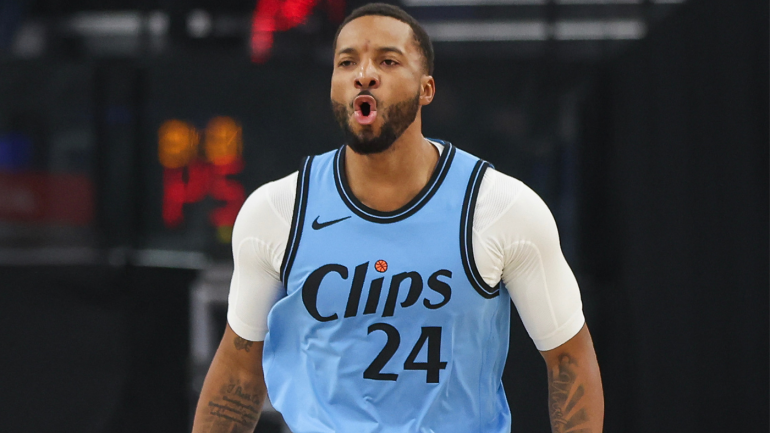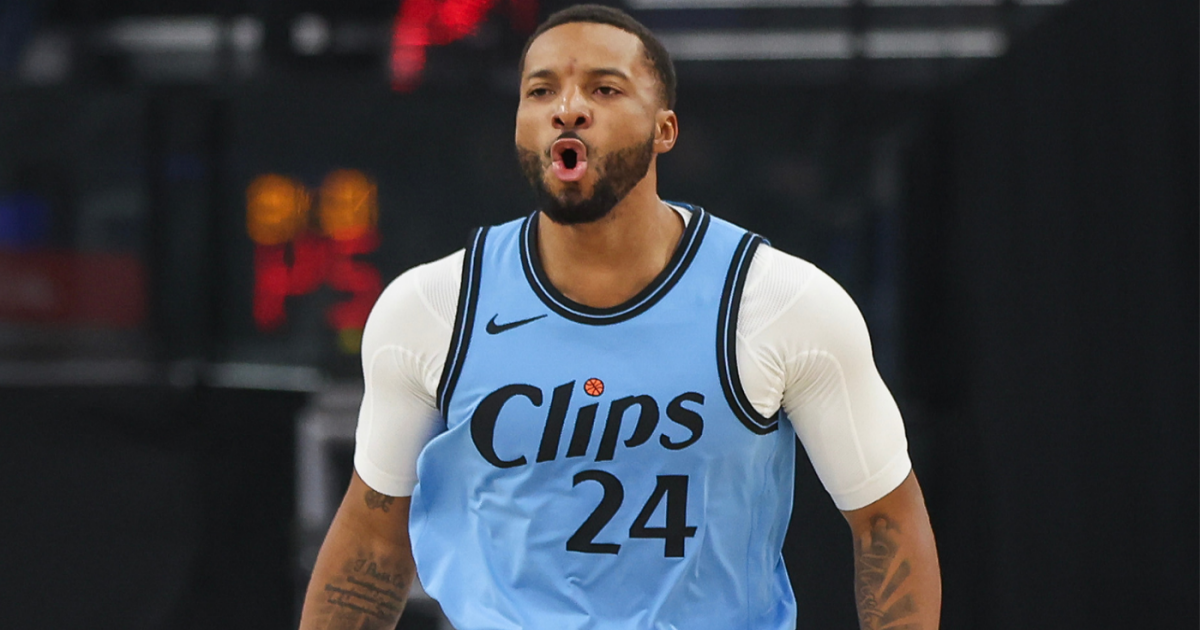
Getty Images
After a career year with the Los Angeles Clippers, Norman Powell is off to the Miami Heat in a three-team trade, according to ESPN. The Heat will acquire the guard in exchange for Kyle Anderson and Kevin Love, both of whom will land with the Utah Jazz. The Clippers will get John Collins from the Jazz, and they’ll send Utah their 2027 second-round pick.
Let’s grade the trade.
Heat: A-
- Miami acquires: Norman Powell
Powell had a legitimate case to make his first All-Star Game last season. That’s not supposed to happen in Year 10, but, before a knee injury and a hamstring injury, he was lights-out for about four months: In 45 games before the All-Star break, Powell averaged 24.2 points on 63.3% true shooting (with .496/.428/.819 shooting splits) in 33.6 minutes per game.
In the aftermath of the Jimmy Butler trade and a first-round series loss to the Cavs that team president Pat Riley described as “humbling,” Miami needed a player like Powell. He will relieve some of the scoring burden on Tyler Herro and Bam Adebayo, and, especially with Duncan Robinson gone, his shooting will improve the overall offensive ecosystem. Powell has made 44.9% of his catch-and-shoot 3s over the past seven seasons.
Five months after the Butler trade, it’s worth remembering that the Heat weren’t supposed to get Anderson or Davion Mitchell in its original incarnation. Mitchell played well enough that he’s sticking around on a two-year contract, and now the front office has effectively turned Anderson into Powell. Not bad!
Miami took back more salary than it sent out, so it is now hard-capped at the first apron and about $3.9 million below it, per capsheets.com‘s Yossi Gozlan. The Heat did not, however, damage their future financial flexibility, unless they plan to extend Powell’s contract. He will make $20.5 million next season and, absent an extension, will be an unrestricted free agent next summer.
Value-wise, it’s hard to argue with what Miami did here, even if this turns out to be a one-year arrangement. Given that the Heat do not plan to bottom out, they might as well try to upgrade the roster, as long as they’re not getting rid of their young guys in the process. It is fair, though, to question their broader strategy. With Powell and rookie Kasparas Jakučionis in the mix, some development from Kel’el Ware and Nikola Jović and a bounce-back season from Jaime Jaquez Jr., they could take a step forward in the East, but they’re still a long way from title contention.
This move means that Miami should no longer be mentioned as a potential landing spot for Bradley Beal or DeMar DeRozan this offseason. It does not necessarily mean, though, that the Heat are less likely to make a big splash in the medium term — if they go star-hunting before next February’s trade deadline, Powell’s $20.5 million expiring contract could come in handy.
Clippers: A-
- Los Angeles acquires: John Collins
It is a bit of a bummer that Powell won’t get to build on what he just did in Los Angeles. He essentially played so well in 2024-25 that the Clippers, who have virtually no money on their books past 2026-27, decided they couldn’t afford him.
Given that Los Angeles gave up a second-round pick in this deal, its motivations might seem confusing. If Powell is the best player in the trade, shouldn’t the Clippers be the ones getting compensated?
Usually, it would indeed work that way, but, with only a year remaining on his contract, the cost of keeping him is priced in. It makes sense that Powell wants to be rewarded for his production, but it also makes sense that teams are skeptical he can sustain that production over the life of his next contract, since he’ll be 33 when it begins.
It seems like Collins has been around forever, but he’s four years younger than Powell and will likely be much less expensive to extend or re-sign. Los Angeles may have softened the blow of Powell’s departure in advance by acquiring Bogdanovic at last season’s deadline, and, if it can add Beal (after his reportedly imminent buyout), then it will have balanced the roster in a meaningful way. It still has $5.3 million of its midlevel exception available to potentially offer Beal, per capsheets.com.
Collins may be the biggest winner of anyone involved in the trade. After a couple of years on the rebuilding Jazz, he’s joining a team that is A) serious and B) constructed to get the most out of him. He can act as a stretch 4 next to Ivica Zubac, and, crucially, he can put pressure on the rim as the roll man as both a center in smallball lineups and when playing next to stretch 5 Brook Lopez. This partnership might not last longer than one season, but it’s an ideal way for Collins to demonstrate his value.
This is an A+ if it leads to the Clippers signing Beal. If not, it’s a B, so I’ll split the difference.
Jazz: A
- Utah acquires: Kyle Anderson, Kevin Love, 2027 second-round pick (from Clippers)
Too much was made of Austin Ainge, Utah’s team president, saying that the team won’t tank next season. In addition to the fact that the Jazz don’t need to take drastic measures to get another high draft pick (primarily because the rest of the Western Conference is so good), their moves since then have indicated that they’re not about to chase the play-in.
After waiving Jordan Clarkson and trading Collin Sexton, the Jazz have parted ways with another veteran, picking up a second-round pick in the process. This isn’t the most exciting transaction, but it’s a lot better than giving up a second-round pick to turn Sexton into Jusuf Nurkic. (I’m still confused by that one.)
Love turns 37 in September and seems like a buyout candidate, as he is on a $4.2 million expiring contract. Anderson turns 32 in September and seems like a trade candidate — he is owed $9.2 million next season, and his $9.7 million 2026-27 salary is non-guaranteed. Utah surely would have loved to get more than a single second-rounder for Collins, but his $26.6 million 2025-26 salary is a bit unwieldy in this cap environment, and Ainge’s front office likely looked at whatever they can get from an eventual Anderson trade as part of the return.
Another factor: Assuming that the Jazz use the midlevel exception to acquire Love and Anderson, they will create a trade exception equal to the value of Collins’ salary. They can use that exception to absorb other teams’ unwanted contracts and add more draft capital. But no, they’re definitely not tanking.


